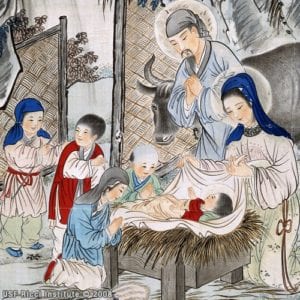
Lesson 1
The Birth of our Savior
The Birth of Jesus was foretold way back in the Old Testament. One of the prophecies came from the prophet Isaiah: “Therefore the Lord himself will give you a sign; the young woman, pregnant and about to bear a son, shall name him Emmanuel (Isaiah 7:14).”
Jesus was born in a manger in Bethlehem. Mary is the mother of Jesus and Joseph was His foster father. The birth of Jesus was told in the Bible in Luke chapters 1-2 and Matthew chapters 1-2. In the Gospel of Luke, the angel Gabriel came to Mary and told her that she will bear a Son, and that she shall name Him Jesus (read Luke 1:26-38). In the Gospel of Matthew, the angel appeared to Joseph in a dream and told him to also name the child Jesus (read Matthew 1:18-25). The name “Jesus” means “God saves”.
Initially, Jesus’ disciples spread God’s message by word of mouth or oral tradition. Later on, these were written down in the Gospels.
Luke and Matthew wrote the mystery of Jesus’ birth differently. Luke wanted to show us that there were signs from God that Jesus, the Messiah was coming true. He wrote about Elizabeth who recognized that Mary was the Virgin Mother of the Savior. He also wrote about the angel appearing to the poor shepherds, who were of little importance in society, and announcing to them the birth of the long awaited Messiah. Messiah means Savior. This could only mean that the Lord had come to save all people, no matter what their status is in society.
Both Matthew and Luke wrote about the genealogy of Jesus. Matthew began his genealogy from Abraham going forward to Jesus (read Matthew 1:1-17); on the other hand, Luke began his genealogy from Jesus going back to Adam (read Luke 3:23-38). In any case, both Matthew and Luke wanted to show that Jesus descended from David, who was the king to whom God promised that the Messiah would be a descendant.
The Gospels of Mark and John do not include accounts of Jesus’ birth. Mark began his Gospel with the preaching of John the Baptist in the desert to emphasize the proclamation of the Good News. John assumed that his readers already know about the story of Jesus’ birth and so focused on the reality of the Incarnation. The Incarnation is the Word made flesh, or the Son of God becoming man, to become one like us. When the Son of God became man, He did not in any way lose His divinity. We believe that Jesus Christ is both fully human and fully divine.
In the Catholic Church, we believe that the Son of God became man to save us from our sins. The Gospel of John tells us: “For God so loved the world that He gave His only Son, so that everyone who believes in Him might not perish, but might have eternal life (John 3:16-17).” The Holy Spirit gives us the gift of faith to help us understand that mystery.
Questions:
- Where in the Old Testament was the Birth of Jesus foretold?
- Why did the Son of God become man?
- What does Incarnation mean?
- Who is the Messiah and what does Messiah mean?